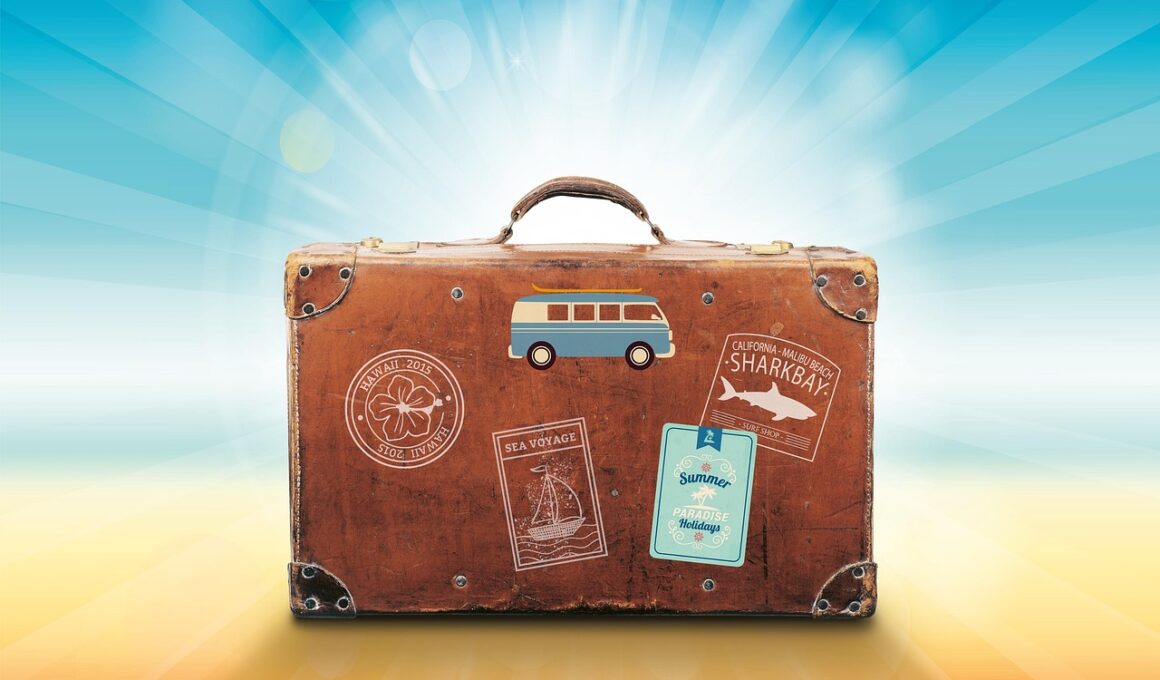Budgeting for Holiday Travel: Tips to Save Big
Planning holiday travel often brings excitement, but it can also lead to unexpected expenses. The key to enjoying your trips is budgeting effectively. Start by examining your previous holiday spending to identify patterns. Tracking where your money goes helps establish a realistic budget for this year. Prioritize essential expenses—transportation, accommodations, and meals. Determine your overall budget based on past experiences and adjust for inflation and personal circumstances. Consider travel insurance to cover unexpected costs; it’s a smart investment. Additionally, set aside a specific amount each month to ease the burden as travel dates approach. This will help you spread out the costs and ensure you’re not overwhelmed financially. When you have a clear budget, you’re less likely to overspend. Websites and apps can help manage travel budgets effectively. Additionally, look into deals and prioritize cost-efficient travel options to stretch your funds. Researching and booking in advance often leads to substantial savings. Always keep an eye on discounts and offers that align with your travel plans. Remember, meticulous planning today leads to meaningful and affordable travel experiences tomorrow.
Finding Affordable Accommodation
Your accommodation can significantly impact your holiday budget. Research various platforms to find cost-effective lodging options. Utilize websites and apps that specialize in budget accommodation. These platforms can reveal hidden gems, like hostels or guesthouses that are often overlooked. Consider alternative options like vacation rentals or home swaps to save money. For additional savings, look for special promotional codes or discounts that can lower your total costs. Staying slightly outside the city center is another great way to save on lodging; public transport can bridge gaps without breaking the bank. Don’t forget to check for free cancellation policies or flexible booking options. This allows for adjustments should travel plans change unexpectedly. Furthermore, you can save more by cooking some meals yourself if your accommodation has a kitchen. Besides, read reviews to gauge the quality, ensuring you receive a great value for your money. Also, inquire about group discounts if traveling with family or friends. Sharing accommodation costs can significantly reduce expenses. By considering a range of accommodation types, you’ll find one that fits your budget while providing comfort and convenience.
Meal costs can add up quickly when you’re on holiday. To manage this, create a daily meal budget, segmenting funds into categories like breakfast, lunch, and dinner. Research local eateries that offer delicious food at lower prices. Look for food trucks or local markets, where you can often find affordable local cuisine. Utilize grocery stores to buy snacks and other essentials, minimizing restaurant visits. Opt for all-inclusive deals only if you’re confident you’ll make the most of them. If dining out, consider early-bird specials or lunch deals that are usually cheaper than dinner options. It’s also wise to ask locals for recommendations for budget-friendly dining. Many impressive experiences stem from discovering hidden spots away from tourist hubs. Additionally, include some picnic lunches during excursions, allowing you to enjoy meals outdoors while saving money. Packing your own meals when traveling allows you to indulge in your favorite foods without overspending. Remember to remain flexible; spontaneity can lead to delicious discoveries without detracting from your budget. Overall, planning your meals carefully will significantly enhance your holiday experience.
Transportation Savings
Transportation is another essential area where planning pays off. Prioritize budget travel options, including discount airlines, trains, or buses. Booking flights or travel routes well in advance can save you significant money. Utilize apps for real-time fare comparisons to find the best deals and routes. If you’re traveling domestically, consider carpooling or sharing rides to minimize expenses. Research public transport options at your destination; many cities offer tourist passes for unlimited travel. Rent a bike or explore on foot — it’s not only economical but a great way to see the sights and immerse yourself in local culture. If driving, keep in mind fuel expenses and parking fees, which can add up quickly. Always check for free or discounted parking options available at your destination. Additionally, factor unexpected transportation costs into your overall budget, such as tolls or luggage fees. Loan programs or shared transportation with friends can offset costs. Employing these strategies leads to considerable transportation savings, enabling more flexibility in your travel plans. With solid research, you can navigate your trips effectively while maintaining your budget.
Look for activities that align with your interests but are also budget-friendly. Research free or low-cost attractions at your destination—a great way to experience local culture without overspending. Consider city passes that provide discounted entry fees for multiple attractions. You can sometimes find special event days when museums or parks offer free admission, enriching your experience. Focus on outdoor activities such as hiking, swimming, or enjoying local parks, which often carry no entry fee. Engaging in community events or festivals can offer valuable insights into the culture at little or no expense. Always be on the lookout for special promotions or discounts specifically aimed at travelers. They can significantly enhance your experience while keeping costs down. Connect with local tourism boards online for insights into current events or attractions. Embrace spontaneity—you may discover unique, free experiences that enrich your holiday. To manage your budget effectively, set individual spending caps for entertainment. It keeps your travel enjoyable while allowing room for participation in those eye-catching activities without guilt or financial strain. Explore and enjoy without breaking the bank!
Travel Insurance and Emergency Fund
Don’t overlook the importance of travel insurance — it provides peace of mind during your holiday. Invest in a reputable insurance policy that offers coverage for cancellation, health emergencies, and theft. While it seems like an additional cost, you’ll be thankful for it if an unexpected situation arises. Understanding the policy ensures you maximize the benefits and coverage. Allocate a portion of your budget for emergencies, relieving anxiety throughout your trip. Contingency funds should cover unexpected costs like medical expenses or repairs. An emergency fund fosters confidence in exploring your destination while minimizing stress. Setting this fund aside encourages mindful spending during your trip. Shop around for insurance costs, as many companies offer competitive rates. Ensure you understand what is and isn’t covered before choosing your provider. Compare various insurance options and reviews from other travelers, ensuring a reliable choice for your situation. Knowing insurance is in place, you can focus on enjoying your holiday rather than worrying about potential mishaps. Don’t forget to communicate your insurance information with travel companions. This ensures everyone is aware in case of emergencies or needs during the trip.
Budgeting for holiday travel requires diligence, research, and flexibility. By creating a comprehensive plan covering every aspect of your travel, you can avoid financial stress. Use these budgeting tips to strategize effectively. Start early to turn dreams into reality without stretching your wallet too thin. Share your travel priorities with companions to establish a mutual understanding of spending limits. Establishing a communication channel fosters collaborative planning while addressing concerns. Consider personal interests and experiences that align with the overall budget. Keeping the lines of communication open ensures everyone enjoys the trip while staying within budget constraints. Document your travel plans, including a budget spreadsheet to track expenses, enhancing accountability. Furthermore, adjusting your budget as new costs arise will allow you to stay on track. Make notes of what works and what doesn’t, refining your approach for future travels. Preparing for holidays can become smoother, making each experience more enjoyable. Remain open to changing your itinerary based on budget realities — flexibility is key! Approaching your holiday with planning and mindfulness helps you enjoy a memorable experience without breaking the bank.


